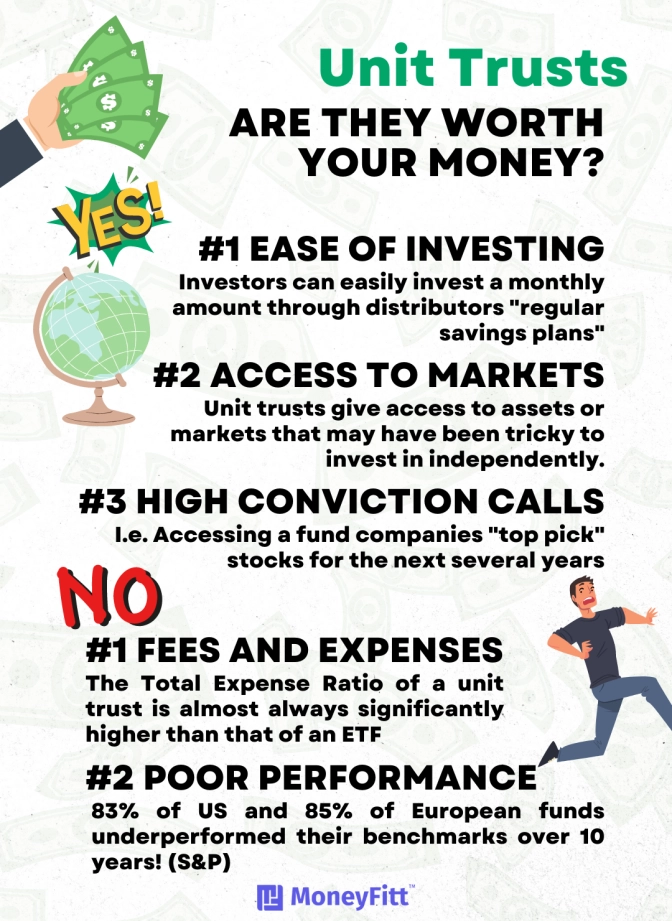The Risks and Benefits of Investing With Fund Distributors
We can’t all have a fund manager like Peter Lynch!
- Unit trusts are an easy and effective way to diversify your portfolio and constitute money pooled from multiple investors and invested into assets such as stocks, bonds and short-term debt.
- Unit trusts are "actively managed" in that they employ well-paid portfolio managers to pick and choose which assets to buy and sell. They seek to outperform their peers or a benchmark.
- Third-party fund distributors, also known as intermediaries, give retail investors an avenue to invest in these unit trusts, either self-directed or with advice. They are usually not affiliated with the fund management companies, so in theory, investors will not be told to invest in funds from any particular manager. In theory.
Risks and Benefits of Investing With Fund Distributors
Main risk: suppose the distributor's sales fees and higher fees charged by actively managed funds have not scared you away yet. In that case, you’ll also have to consider the performance risk involved when investing in them. It may surprise you, but most actively managed funds do not outperform the market, however clever they appear on CNBC!
A recent Morningstar report found that over a ten year period, only 25% of all active funds beat their tracker counterparts.
Additionally,
- According to S&P Dow Jones Indices, as of Jun 30, 2021, 82.5% of US large-cap funds underperformed the S&P500 after just ten years.
- In Europe, 84.8% of Europe Equity funds had underperformed the S&P Europe 350.
- Still, that's better than managers in Chile, 97.8% of whom underperformed their benchmark over ten years!
Instead...
You could consider investing the bulk of your money in ETFs that track indexes like the S&P 500, FTSE 100 or EURO STOXX 50, with smaller positions in single stocks or thematic unit trusts. These smaller positions may provide your portfolio with a near term performance boost, and doing so is known as the Core-Satellite Strategy.
Of course, all investing comes with risks. Investing in actively managed funds (through a fund distributor or directly) may increase or decrease those risks, depending on many factors. That said, having many or all of your unit trust investments organised in one place may help you make better decisions (with or without an advisor) though usually with more costs involved.

Should I Invest With a Fund Distributor Over Other Types of Platforms?
As we have mentioned above, there are a few different types of fund distributor models. Still, for now, we will simply look at the leading intermediaries that provide a business-to-consumer model.
These intermediaries will typically provide a “regular savings plan” where investors invest a minimum amount monthly and choose from various funds. This would be a relatively low effort way for you to put your money to work in the market and to do so with "dollar cost averaging" (i.e. periodically investing a fixed sum regardless of the unit trust’s price, meaning you buy more units when prices are lower and fewer when prices are higher.)
This may not seem different from robo advisor investing. However, your returns and performance may fluctuate more because unit trust investments are actively managed. The main factors you will have to consider if choosing between different investment strategies would be your level of risk aversion and the amount of time and money you are willing to invest into tracking your investments’ performance.
Although fund distribution platforms offer a wide range of unit trusts to invest in, you will, of course, not be able to influence the individual fund managers' investment decisions. As a result, you will have to do your due diligence when choosing funds. A trusted financial advisor may be able to help you narrow down the choices.
As mentioned earlier, active managers could be suitable as a satellite option. “Satellites” are a collection of actively managed investments that you believe will outperform the market. They will complement the “core” of your portfolio, which acts as a stable foundation made up of large-cap stocks and ETFs.
If you are lucky, you may have identified and invested in a fund managed by a legendary manager such as Peter Lynch, formerly of the Fidelity Magellan Fund. Under Lynch’s portfolio management from 1977 to 1990, the fund generated an astonishing annualised return of 29.2%! Giving a baby a $10,000 investment that grew at 29% a year would be worth more than $270,000 by the time they became a teenager! However, you should note that managers like these are the exception rather than the rule. Peter Lynch was a total outlier.

However, the historical outperformance of a fund (or a "star manager") does NOT mean the good results will last forever. For example, Neil Woodford, a superstar manager at Invesco Perpetual in the UK. Woodford generated over 13% a year over 25 years before setting up the Woodford Equity Income Fund in 2014. It performed so badly that it collapsed entirely in 2019 and caused thousands of loyal investors to suffer enormous losses.
RISKS AND BENEFITS OF INVESTMENT FUND PLATFORMS. COMPLETED. ✅
Sources:
- https://www.moneysense.gov.sg/articles/2018/10/understanding-unit-trusts
- https://dollarsandsense.sg/12-investment-platforms-singaporeans-can-use-invest-fixed-monthly-sum/
- https://www.investopedia.com/terms/t/thirdpartydistributor.asp
- https://www.afhwm.co.uk/news/story/what-is-an-investment-platform/
- https://www.accenture.com/lu-en/blogs/belux/the-future-of-fund-distribution
- https://www.bloomberg.com/news/articles/2021-12-07/peter-lynch-says-all-in-on-passive-investing-is-all-wrong
- https://www.theguardian.com/business/2019/jun/08/neil-woodford-fund-manager-rise-and-fall-investors-bright-star-black-hole
- https://www.statista.com/statistics/224579/worldwide-etf-assets-under-management-since-1997/
- https://www.morningstar.co.uk/uk/news/210970/active-funds-fail-the-test-in-2020.aspx
- https://www.imf.org/en/Publications/WP/Issues/2021/03/19/Pricing-Protest-The-Response-of-Financial-Markets-to-Social-Unrest-50146
- Header photo from Unsplash
